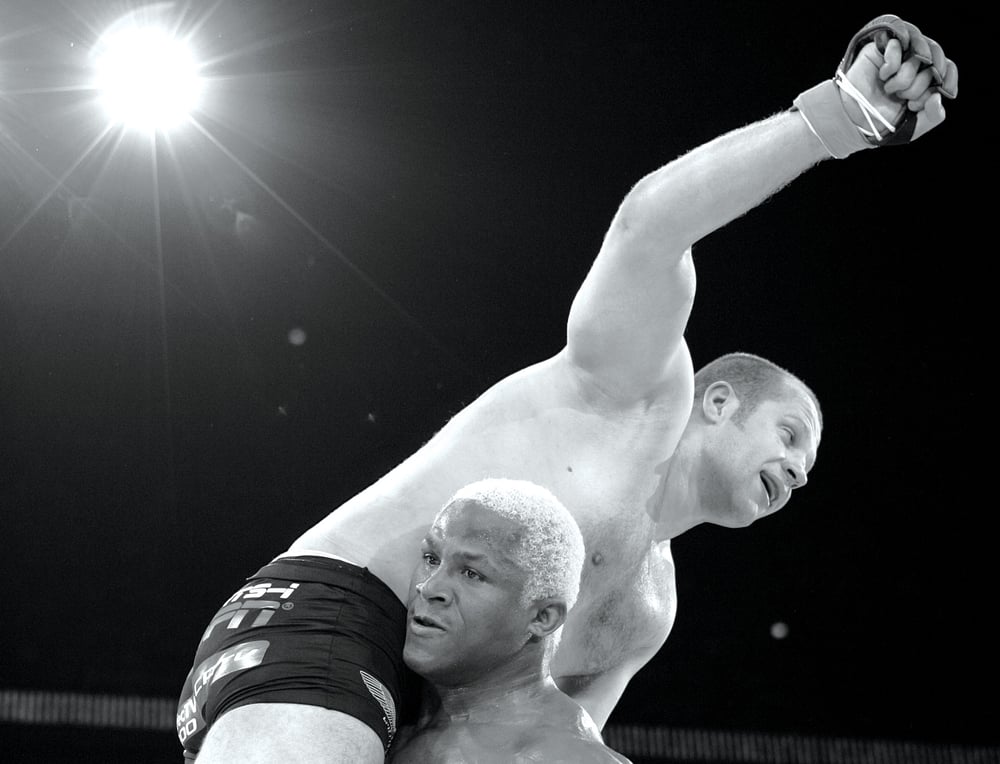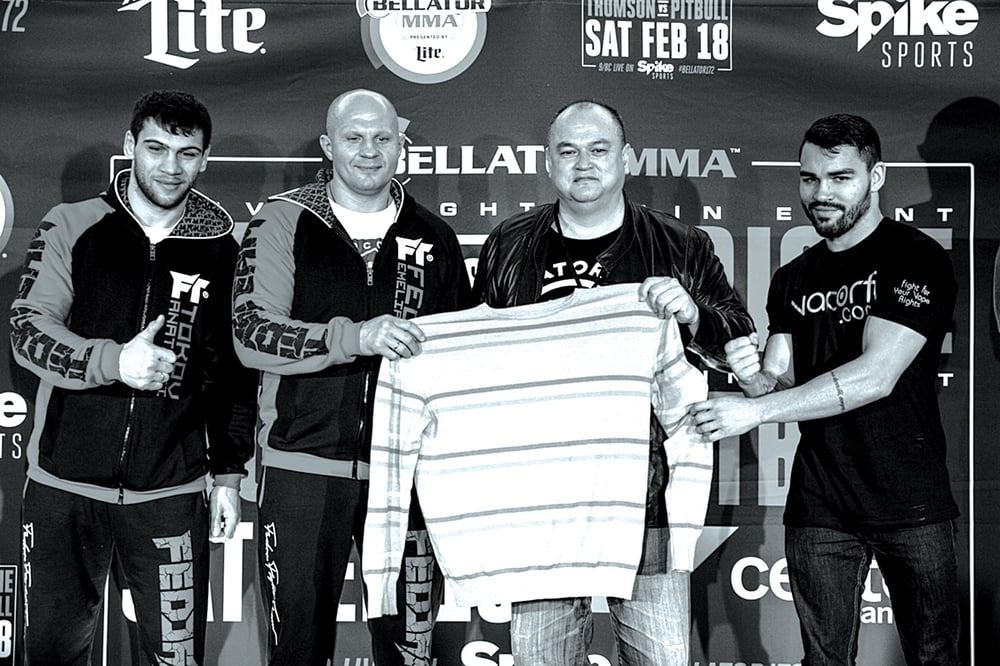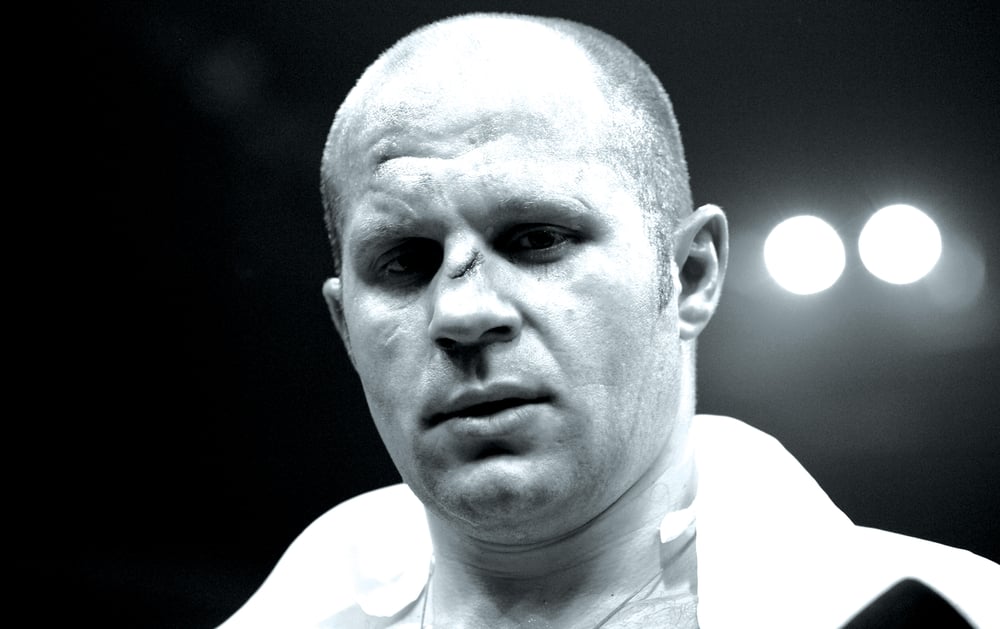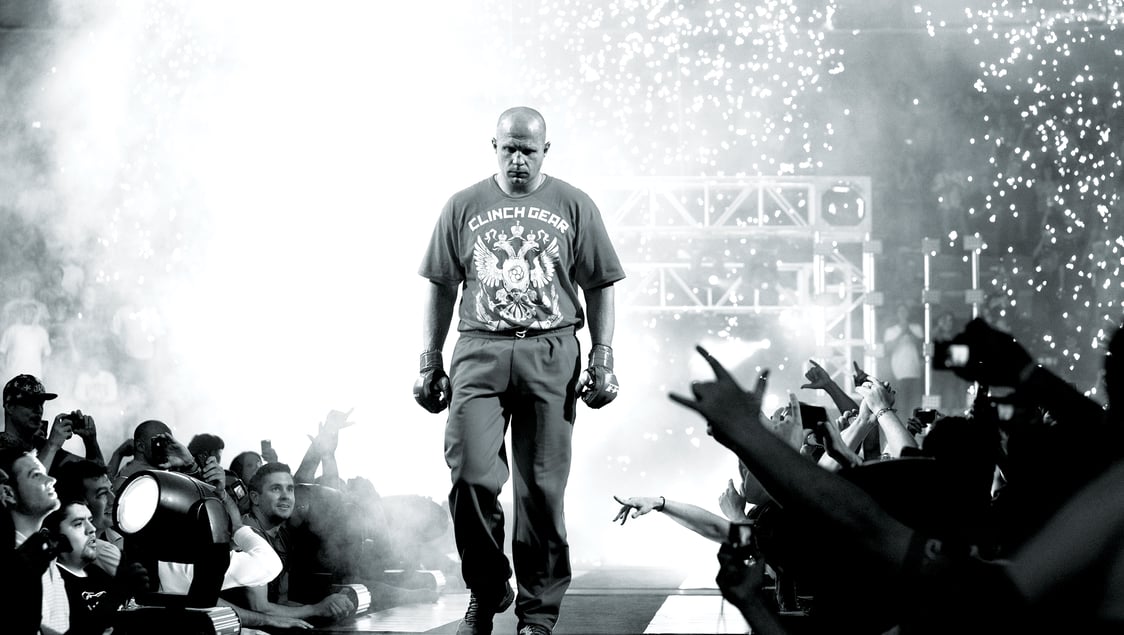
Issue 156
July 2017
How Fedor Emelianenko’s life, from the depths of the Soviet Union to the world stage, made him the most feared fighter on the planet – and a mixed martial artist unlike any other.
The heavyweight champion is the most feared man on Earth. Asserting that dominance over a sustained period is a weighty accomplishment. It carries a celebrity status, an adoration few sportsmen can ever dream of enjoying. The leading fighter in the heavyweight division can create legend and be elevated to an almost God-like status.
Fedor Emelianenko, standing at just under six feet tall and weighing 16-and-a-half stone, enjoyed all these trappings during an extraordinary period in the 2000s, becoming a revered fighting figure after a winning run in the heavyweight division that defied belief. But the man has never changed. His feats only added to the mystique and enigma surrounding the greatest heavyweight fighter in the storied history of the sport.
Crucially, Emelianenko has stayed true to his roots: he lives in the same iron ore mining town, his belief in God is his guide is unwavering, and he carries intimacy with his family in his heart. It has meant Fedor’s humility has never left him. Extraordinary in itself, given he counts among his friends Hollywood A-listers and the incumbent Presidents of both Russia and the United States. And they are fans of his work. That is why Fedor often recites the proverb: “Never consider yourself higher, better, because then the fall will be harder.”
“A fighter must give all his strength to his training,” he says, “and treat others humanely. And the rest lies in the will of God.” That mantra repeats itself, as stark as his own flurries in fights.
Rewind 40 years to September 1976, and Fedor (whose name means ‘Gift of God’) Emelianenko was born in the city of Rubizhne – a tiny industrial town centered on chemicals and plastics in the region of Luhansk, Ukraine, then a part of the old Soviet Union.

When he was two years old, the cute kid with the round face bearing a sheepish look moved 250 miles north-east with his family and across an imaginary border at the time into Russia proper, to another industrial town – Stary Oskol, in Belgorod.
It was a center of iron ore mining. His mother, Olga Fedorovna, was a teacher, and his father, Vladimir Alexandrovich, a welder. It is a city he is deeply proud of representing, as proud as he is of being a Russian citizen.
The town of Stary Oskol was founded in 1593 as a fortress, a part of the southern fortification line around Moscow, 400 miles north. In the next century, it was sacked by Crimean Tatars and Ukrainian Cossacks. And in keeping with history, it was from here where Fedor created his own fortress of dominance.
Whenever there today, between fights and appearances, he takes an early morning five-mile run around the town before heading to the crusty old gym he has employed as his office for 15 years.
Fedor is a creature of habit. And his habits are good ones, centered around physical and spiritual adherence. He never departs from this credo. Perhaps that has come from a simple, grounded upbringing, based on hard work and religion. Emelianenko, the second of four siblings – one older sister, two younger brothers – was a focused student, finished high school in 1991, and three years later graduated with honors from a professional trade school.
Even as a 10-year-old boy, judo and sambo took up much of his time, while his parents instilled religion into him. Indeed, his two younger brothers Aleksander (born in 1981) and Ivan (born in 1988) are also fighters. The gym simply became his hobby, an addiction. After school, with his parents working long hours, he spent many evenings in the gym.
Looking back on his early life, Fedor explained: “I always wanted to be in martial arts. There were no signs (of what I would achieve) but there was a great desire. I think when I was young, when I was a little boy, every boy in our country wanted to be a martial artist. My father always encouraged me to go into sports. He always attended my competitions. And always encouraged me.”

Finishing his education, then aged 19, a fresh-faced Fedor left Stary Oskol and served in the Russian Army as a military firefighter. Those two years were to change the course of his life forever. His time in the army was significant for two reasons: his parents divorced, and he started combat sambo.
With time allowed to train and practice, it created the perfect storm, and his aptitude for it knew no bounds.
The Russian fighting system was perfect for Fedor, melding the skills and work ethic from almost a decade of judo and junior sambo. Combat sambo combines all of the most effective techniques from a variety of martial arts and remains one of the best transitional sports into MMA, as we have witnessed with so many Eastern European fighters coming to the sport.
Finishing his military term in 1997, Emelianenko joined the Russian Top Team gym to begin training for an MMA career. And it was to set him on a trail of total destruction.
Emelianenko began his MMA career on May 21, 2000, with four straight victories, including a win over ADCC champion Ricardo Arona, widely reported as one of the toughest fights in his career. Apart from the controversial loss to Tsuyoshi Kohsaka on December 22, 2000 – by doctor stoppage after 17 seconds – in his next 28 fights up until June 26, 2010, the Russian went unbeaten, a run that included wins over four former UFC champions, a Pride FC champion, one former and two future K-1 champions, and two Olympic medalists.
To set the record straight, he also won his rematch against Kohsaka, via a first-round TKO by doctor stoppage. In the same period, Fedor won the world 100kg+ sambo championship title four times.
Through it all he was the ice-man, dozing in his dressing room before bouts, always seemingly nerveless. But there were nerves, he recalled. Nor did he feel invincible, either, he admits. “Every time I was preparing for a fight, I was ready for any result. For me, it was always God’s will what happens in there. But everybody is nervous, I think. Before I start warming up before the fight, I am (nervous).”
Nonetheless, that period in his career would lead him to be seen as the most dangerous man in Russia and completed the creation of a fighting colossus. It is not overstating it to say that family remains central to the man’s beliefs, along with his faith. He has been married three times, twice to the same woman, and has four children. He loves nothing more than to be with his family.
Adding to the Russian’s mystique was his reliance on traditional training methods such as outdoor push-ups and pull-ups, dips and extensive road work, frequently at altitude.
Despite his smaller size in comparison to his opponents, Fedor found more success at heavyweight than most could ever hope to achieve. There are so many facets to the man. The sporting hero Emelianenko brings to mind, when asked, is Prince Alexander Nevsky, a thirteenth-century nobleman and military leader who rose to legendary status on account of his military victories over German and Swedish invaders. He was later made a saint.

Back in Stary Oskol, there is a more prosaic tale. Old habits die hard. Emelianenko starts every day with that famed five-mile run, before heading to the gym with weathered punch bags and old-fashioned, crafted weights. Emelianenko is in his element, in his office. It has been this way for 15 years. Ability and aptitude for physical work are the touchstones to success, he says. “I think it’s both. I had a huge desire and I tried to support this desire with a huge industrious work ethic.”
Emelianenko’s name resonates across fight sports. “Everyone has their day and in his day, he was ‘the guy’,” says fight and wrestling historian Dave Meltzer. “He was the number one guy. He beat (Antonio Rodrigo) Nogueira in 2003, and at the time that was an upset. At the time, everyone thought Nogueira would beat him. For the next couple of years in Pride, he beat everyone they put against him. In this sport to win that many in a row – not all were top guys but many of them were – is very difficult. It was an amazing run.”
Fedor always found a way to win, to escape from adversity in fights and turn it on its head. Against Mirko Cro Cop, against Kevin Randleman – in fact, against all comers.
While never becoming a mainstream star in the United States, he is still revered in Russia. When Emelianenko defeated Pedro Rizzo on June 21, 2012, in what was supposed to be the final fight of his professional career, President Putin stepped into the ring and congratulated him. Back in the elections in 2012, Fedor campaigned for the ‘United Russia’ party in support of Putin, who won a third term of presidency.
Emelianenko’s manner and standing has seen him elevated in his homeland to office. In 2010, he was elected to a five-year term as a deputy of the Belgorod Regional Duma, representing the loyalist United Russia political party. On July 28, 2012, Emelianenko replaced Russian Prime Minister Dmitry Medvedev as a staff member of Russia’s Council on Physical Fitness and Sports. The decree was signed by Putin himself. Today, Fedor also serves as the head of the Russian MMA Union. Putin contacts the fighter and wishes him good luck before his contests. He is talismanic in his country.
As Jerry Millen, Fedor’s manager, and a former vice-president of Pride, explained: “I’ve been in fighting and entertainment and television and all these crazy worlds and many people change a lot when they get fame and money and I’ve seen it firsthand. It changes people. But he’s still the same guy. I’ve been to Russia so many times with him and been to Stary Oskol and met his mother. He’s just a normal dude at home, a simple guy.”
To get to Stary Oskol, says Millen, is “a challenge” in itself. “You fly into Moscow and then take a train for 13 hours. A sleeper train through the middle of Russia. Fedor takes the train. I didn’t expect that. I thought he’d fly. But that’s how normal he is. He flies coach with his team, by the way. He doesn’t expect all the extra stuff like Floyd Mayweather. He’s all about him and his team.”
Millen first met Fedor 15 years ago. “At that time, I was vice-president of Pride fighting championships and Fedor came into our interview room. As we get older our personalities change and we become much more open – I know him much better now – but then he was very quiet, a little shy, and he didn’t answer a lot of questions. I was like, ‘So, tell me how bad you want to beat your opponent.’ He was like, ‘I wish him the best.’ ‘But you want to kill him, right? Knock him out?’ ‘I hope to put on a good show, God’s will’, he said. I tried to get him talking a little trash and he refused. I know when to stop and when to realize this is just who he is. He does all of his talking in the ring or the cage.”

Scott Coker, the CEO of Bellator MMA, for whom Fedor now fights, and who also secured him for a time in Strikeforce, explains: “He’s a special person. When you first see him fight and he’s just beating up everybody, back in the Pride days, he seemed like that character in the James Bond movies, the Russian assassin. That’s what I used to think. He becomes this full killer. You look at that run he had there. The fight that did it for me was when he beat Mirko Cro Cop. Mirko was of the best strikers on the planet. He just walked through him. He walked through his punches and kicks like it was nothing.
“He goes to church on Sundays. It’s pretty fascinating. He lives a good, clean life. He has his students that he loves and he wants to get them fights. He is the example and the mentor for them. His body of work will speak for itself and how he carries himself will speak for itself. You talk about martial arts character. He’s got all that. That’s what I love about him.”
‘Big’ John McCarthy, the referee, sees the Russian fighter as special. “Fedor did something at a time, in a location, that nobody thought could be done. He never had a loss for 32 or 33 fights as a heavyweight in Pride at a time when everyone looked at the heavyweights as the best in the world.
“He was fighting Nogueira multiple times and he was fighting Cro Cop when Cro Cop was destroying everybody. He’s the one who wrote the blueprint on how you beat Cro Cop. It was not only his performances and the people he was beating, it was the manner in which he was doing it and the manner in which he acted. Because he was so stoic and he didn’t talk about himself.
“He is the epitome of the pure fighter. He’s not the pure entertainer. There are so many people that can fight and talk themselves up, like Conor McGregor, but he didn’t do that. He was stoic throughout. No emotion. The only thing he’d do is raise his hand and turn around and face people and then go out and just destroy good fighters.
Manager Millen again. “He was at his height when the heavyweight division in MMA was at its best. Back then you had Nogueira, Cro Cop, Randy Couture, Fedor, Mark Hunt, all these guys. To me, that was the pinnacle. That was the Mike Tyson era of heavyweights. Fedor was the Tyson.”
Back to Fedor, and I ask the great man about legacy. “I would like to be remembered not only in sports but in life in general as an orthodox Christian. My opponents are human beings and people. Nothing is down to coincidence. God decides.” As enigmatic as ever. With a champion’s heart, inspired by God, he was the real deal. He defied the odds, the styles against him, and refused to change.
That’s why Fedor Emelianenko really is ‘The Last Emperor’ of the heavyweight division.
Why so serious?
Stoic. Serious. Ice cold. That’s the popular portrayal of Fedor, but the man has his quirks. There’s the ‘Glorious Sweater of Absolute Victory’, a stripy affront against fighters’ traditional attire that he has worn for a decade to the amusement of media and fans. It’s developed its own cult following. He also loves Apple products and electronics.
He’s also got a sense of humor. “When you actually hang out with this guy, he’s funny,” says Scott Coker. “He’d be the comedian who wouldn’t say a lot but when he did you’d laugh.”
John McCarthy adds: “He’s funny, he loves playing practical jokes, he’s got a great personality. He’s got this persona that he’s ice, when he’s everything but.”
Unfortunately for his opponents, he was still always deadly serious in the ring.
...









